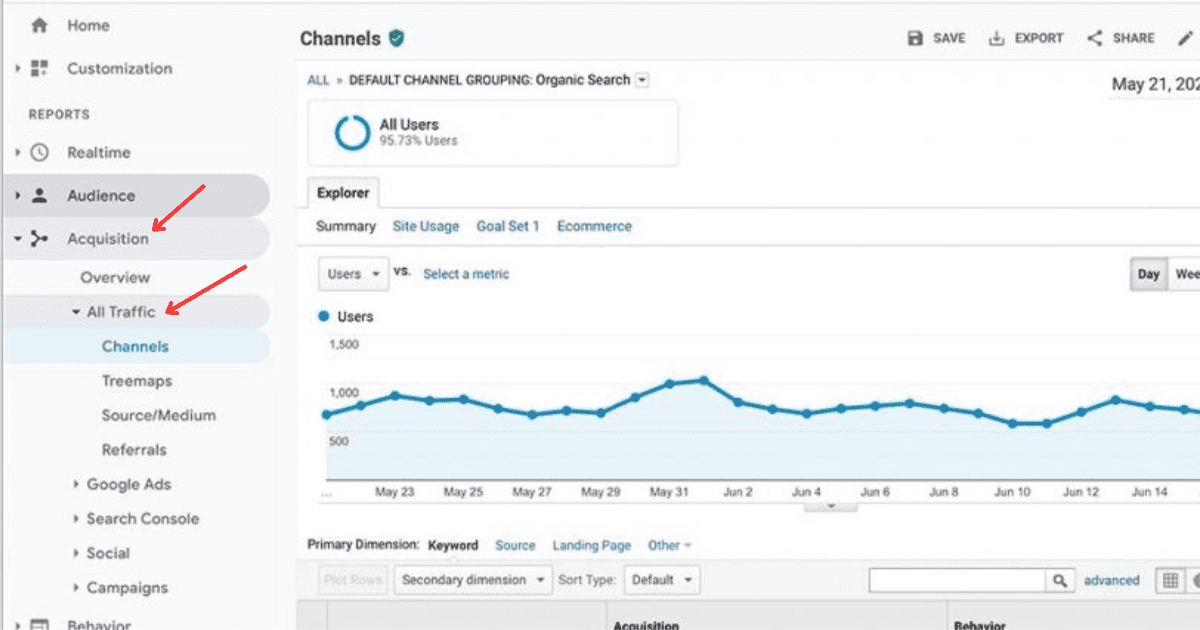SEO Web Club

Search engine optimization (SEO) is an integral part of any digital marketing campaign. It is a set of practices that help websites rank higher on search engine results pages (SERPs) and increase visibility to potential customers. The goal of tracking SEO metrics is to drive more organic traffic to a website and generate more leads and sales.
However, SEO is not a one-time process. It requires constant monitoring and adjustments to ensure that the website is performing well on search engines.
To track the success of your SEO efforts, it’s essential to monitor and analyze specific SEO metrics regularly. These metrics provide insight into how well your website is performing, what’s working, and what’s not.
By tracking these metrics, you can identify areas of improvement and optimize your website accordingly. In this article, we’ll discuss the top SEO metrics you should be tracking to improve your digital marketing and SEO campaigns.
Understanding the importance of tracking SEO metrics is essential for digital marketing campaigns’ success. SEO metrics provide valuable insights into website performance, visitor behavior, and the effectiveness of digital marketing strategies.
By tracking SEO metrics, businesses can identify areas for improvement and make data-driven decisions to optimize their website’s performance and increase their online visibility.
SEO metrics can help your business to track the performance of your website and identify areas for improvement.
For instance, monitoring the organic search traffic can help businesses understand how well their website is performing in search engine results pages (SERPs).
Moreover, tracking SEO metrics can help businesses understand visitor behavior and preferences. By examining metrics such as bounce rate, time on site, and pages per session, businesses can identify which pages are engaging visitors and which ones need improvement.
Businesses can also monitor conversion rates to track the effectiveness of their digital marketing strategies in converting visitors into customers.
To achieve success in digital marketing, it is essential to track various SEO metrics. Here are some of the top SEO metrics that you should track.
Organic traffic refers to the visitors that come to your website as a result of unpaid search engine results.
It is a crucial SEO metric to track because it shows the number of people who found your website through a search engine, such as Google, without any paid advertising.
By tracking organic traffic, you can determine the effectiveness of your SEO strategy and make necessary improvements to increase your website’s visibility in search engine results pages (SERPs).
Organic traffic can be further segmented by various factors, such as location, device, and time period, which can provide valuable insights into your audience and their behavior.
To check your website’s organic traffic, you can use a variety of tools such as Google Analytics, SEMrush, Ahrefs, and more. Here’s how you can check organic traffic using Google Analytics:

Additionally, you can use other tools like SEMrush to get more insights into your website’s organic traffic. SEMrush allows you to track your website’s position in search engine results pages (SERPs), find new keywords to target, and even see what your competitors are doing.
Keyword rankings refer to the position of a website or a web page in the search engine results pages (SERPs) for a particular keyword or phrase. Tracking keyword rankings is essential in understanding how a website is performing in terms of SEO, as higher rankings usually translate to higher visibility and more traffic.
In our keyword research services, Our SEO experts identify which keywords are driving the most traffic to the website, and which ones need more attention.
To track keyword rankings, SEO experts can use various tools, such as Ahrefs, SEMrush, and Moz.
These tools provide keyword-tracking features that allow users to monitor their website’s rankings for specific keywords over time.
By regularly tracking keyword rankings, SEO experts can identify fluctuations and trends and adjust their strategies accordingly. Additionally, they can identify potential opportunities for new keywords to target and optimize their content accordingly.
To check your keyword rankings, you can use various keyword ranking tools, such as Ahrefs, SEMrush, Moz, and Google Search Console. Here are the steps to check your keyword rankings:
Choose a keyword ranking tool that suits your needs and budget. A few popular ones are Ahrefs, SEMrush, Moz, and Google Search Console.
Backlinks are another important SEO metric to track as they play a crucial role in determining the authority and credibility of your website. Backlinks are essentially links from other websites that point to your website, indicating that your content is valuable and relevant.
Search engines consider the number and quality of backlinks when ranking websites in search results. If you do have not time to create quality backlinks you can also hire a backlinks services provider to create quality backlinks for your website that meets the guidelines of Google.
It’s important to keep track of your backlinks regularly and monitor for any toxic or low-quality links. These can negatively impact your website’s ranking and authority. You can use tools such as Ahrefs’ Backlink Checker or SEMrush’s Backlink Audit to identify and disavow any harmful backlinks.
Click-Through Rate (CTR) is another important metric that SEO experts should track to measure the effectiveness of their digital marketing campaigns. CTR refers to the number of clicks your website receives divided by the number of impressions it generates on search engine results pages (SERPs).
A high CTR indicates that your website is relevant and appealing to users, which can ultimately lead to higher rankings and increased organic traffic.
On the other hand, a low CTR may indicate that your website’s content or meta descriptions are not engaging enough to entice users to click through to your site.
To improve your website’s CTR, you can focus on optimizing your meta descriptions and page titles to make them more compelling and relevant to users.
It’s also important to ensure that your website’s content is high-quality and provides value to your target audience.
Additionally, using schema markup and other structured data can help improve the appearance of your website on SERPs and increase the likelihood of users clicking through to your site.
Bounce rate refers to the percentage of users who land on a webpage but leave without visiting any other pages on the same website. A high bounce rate can indicate that your website content is not relevant or engaging enough for your target audience. By tracking your bounce rate, you can identify which pages need improvement and optimize them to increase engagement.
Conversion rate refers to the percentage of visitors who complete a desired action on your website, such as making a purchase or filling out a contact form. By tracking your conversion rate, you can determine the effectiveness of your website in achieving its goals. If your conversion rate is low, you may need to adjust your website design, content, or call-to-action to better engage your audience and increase conversions.
Dwell time refers to the length of time that a user spends on a web page before returning to the search engine results page (SERP). It is an important metric for search engines because it indicates whether the page is providing valuable content to users.
A high dwell time can positively impact your search engine rankings, while a low dwell time can negatively impact your rankings. To improve your dwell time, focus on creating high-quality content that is relevant and engaging to your target audience. You can also improve your page load speed and user experience to encourage users to stay on your site longer.
Tracking and analyzing SEO metrics can be a daunting task, but thankfully, there are a number of tools available to make the process easier. Here are some of the top tools that can help you track and analyze SEO metrics:
This is a free tool provided by Google that allows you to track a wide range of metrics, including organic traffic, bounce rate, dwell time, and conversion rate. Google Analytics also provides detailed reports and insights that can help you understand how your website is performing.
This is another free tool provided by Google that allows you to track a range of metrics, including keyword rankings, organic traffic, and click-through rates. Google Search Console also provides insights into how Google crawls and indexes your website, which can help you improve your SEO performance.
This is a comprehensive SEO tool that offers a range of features, including backlink tracking, keyword research, and competitor analysis. Ahrefs is a paid tool, but it provides detailed data and insights that can help you improve your SEO strategy.
This is another popular SEO tool that offers a range of features, including keyword research, site audit, and competitor analysis. SEMrush is also a paid tool, but it provides a wealth of data and insights that can help you improve your SEO performance.
Moz is a suite of SEO tools that includes features such as keyword research, link building, and site auditing. Moz offers both free and paid plans and its tools can help you track and analyze a wide range of SEO metrics.
Screaming Frog is a website crawler that can be used to analyze on-page SEO factors, such as title tags, meta descriptions, and headers.
By using these tools, you can gain valuable insights into your website’s SEO performance, and make data-driven decisions to improve your digital marketing and SEO campaigns.
Once you have started tracking and analyzing your SEO metrics, there are several tips you can follow to use this information to improve your digital marketing SEO campaigns:
Use your SEO metrics to set realistic goals for your digital marketing and SEO campaigns. For example, if you are tracking your keyword rankings, set a goal to increase your ranking for a specific keyword by a certain number of positions within a certain timeframe.
Look for areas where your metrics are underperforming and identify what changes you can make to improve them. For example, if your bounce rate is high, consider making changes to your website design or content to encourage visitors to stay longer.
Use your SEO metrics to test different strategies and iterate based on what is working and what is not. For example, if you are trying to increase your click-through rate, test different meta descriptions and titles to see which ones result in more clicks.
Use your SEO metrics to track your competitors and identify areas where they are outperforming you. Use this information to make changes to your own strategy and stay competitive.
Use your SEO metrics to demonstrate the value of your digital marketing and SEO campaigns to stakeholders and justify investment in SEO and other digital marketing efforts.
By following these tips, you can use your SEO metrics to continuously improve your digital marketing and SEO campaigns and drive better results for your business.